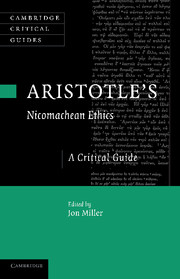Book contents
- Frontmatter
- Contents
- Contributors
- Acknowledgments
- Abbreviations and transliteration
- Introduction
- Part I Textual issues
- Part II Happiness
- Chapter 2 Living for the sake of an ultimate end
- Chapter 3 Contemplation and eudaimonia in the Nicomachean Ethics
- Chapter 4 Aristotle on eudaimonia, nous, and divinity
- Part III Philosophical psychology
- Part IV Virtues
- Bibliography
- Index
Chapter 4 - Aristotle on eudaimonia, nous, and divinity
Published online by Cambridge University Press: 07 September 2011
- Frontmatter
- Contents
- Contributors
- Acknowledgments
- Abbreviations and transliteration
- Introduction
- Part I Textual issues
- Part II Happiness
- Chapter 2 Living for the sake of an ultimate end
- Chapter 3 Contemplation and eudaimonia in the Nicomachean Ethics
- Chapter 4 Aristotle on eudaimonia, nous, and divinity
- Part III Philosophical psychology
- Part IV Virtues
- Bibliography
- Index
Summary
No work in the ancient philosophy corpus has generated more scholarly discussion in recent years than Aristotle’s Nicomachean Ethics (N.E.), and no issue that it raises has been more controversial than Aristotle’s position(s) throughout the work concerning the ultimate human good, which he consistently identifies with eudaimonia (conventionally translated as “happiness”). Debate has chiefly centered on the question whether Aristotle represents eudaimonia as comprising a plurality of intrinsically choiceworthy goods (“inclusive” end) – meaning either a set of virtuous activities or this plus various intrinsic goods such as pleasure and friends – or whether, instead, he envisions it to be a unitary goal (“dominant” end) consisting strictly in just one supremely excellent thing, more specifically, a single kind of virtuous activity. It is widely agreed that his preliminary discussion of eudaimonia in Book i of N.E. is couched in terms that are too general or too ambiguous to settle the question decisively, though they tend, in my view, to favor the “inclusive” alternative. However, in Book x Aristotle states unequivocally that the happiest life consists in the exercise of intellectual virtue or contemplation (theoria), while the political life of moral virtue (which he has been exclusively treating throughout Books ii–v and vii–ix) is happiest only “secondarily” (N.E. x.7–8, 1178a6–10). A page or two later he writes (1178b28–32):
Happiness extends, then, just so far as contemplation does, and those to whom contemplation more fully belongs are more truly happy, not incidentally but in virtue of the contemplation; for this in itself is precious. Happiness therefore must be some kind of contemplation (theoria tis).
Taken just by themselves, these passages, especially the last one quoted, undoubtedly favor the “dominant end” interpretation.
- Type
- Chapter
- Information
- Aristotle's Nicomachean EthicsA Critical Guide, pp. 92 - 114Publisher: Cambridge University PressPrint publication year: 2011
- 10
- Cited by



